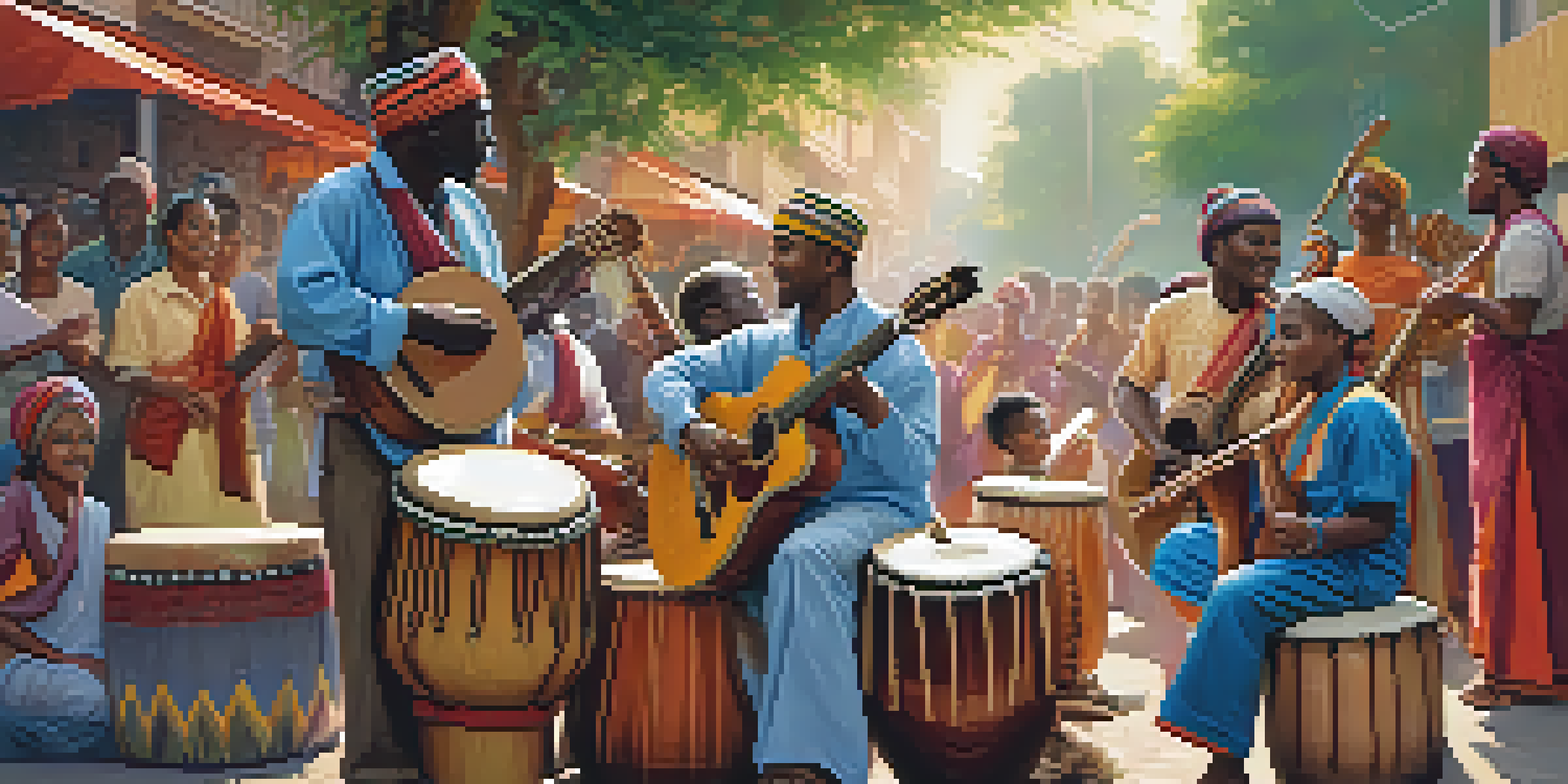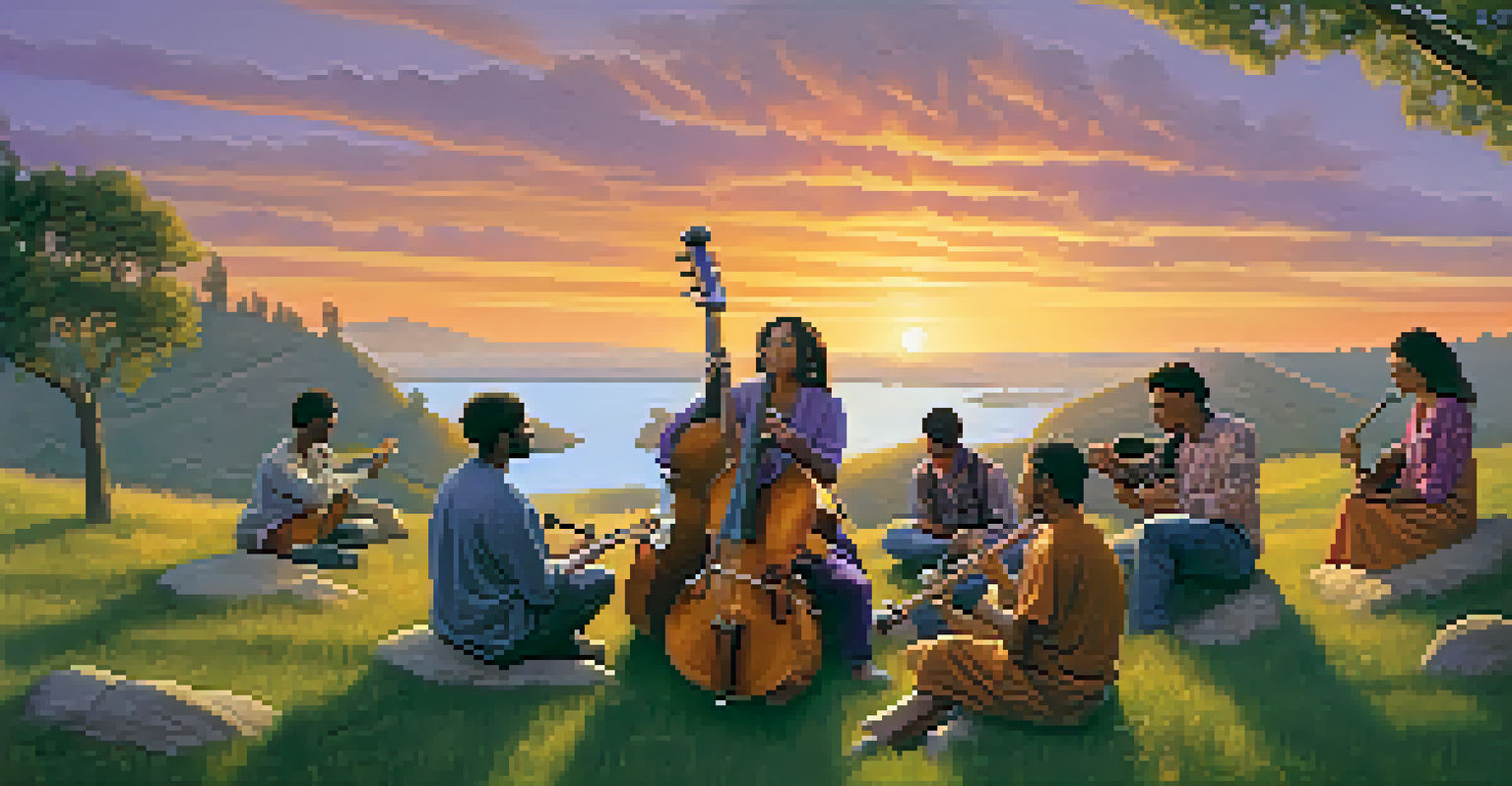Cultural Appropriation in Music: Identity and Ethics Explored

Understanding Cultural Appropriation in Music
Cultural appropriation in music refers to the adoption of elements from one culture by artists from another, often without understanding or respecting the origins. This phenomenon can be seen in various genres, where artists borrow styles, instruments, or themes. While inspiration is a natural part of creativity, appropriation raises ethical questions about representation and respect.
Cultural appropriation is when a dominant culture takes elements from a marginalized culture without understanding or respecting the significance of those elements.
For instance, when a pop star incorporates traditional African rhythms into their music, it can be a celebration of that culture. However, if the artist fails to credit the source or profit disproportionately from it, it can feel exploitative to the original culture. This line between homage and appropriation is often blurred, making it essential to navigate these waters carefully.
Understanding this concept is crucial for both artists and listeners. It encourages a deeper appreciation for the roots of the music we enjoy and fosters conversations about identity, respect, and the complexities of cultural exchange. Ignoring these discussions can lead to misunderstandings and cultural insensitivity.
The Historical Context of Cultural Exchange
Cultural exchange has existed for centuries, with music often serving as a bridge between diverse communities. From the spread of jazz in the early 20th century to the global reach of reggae, music has facilitated connections across cultures. However, this exchange must be seen in the context of power dynamics, as historically marginalized cultures often find their contributions overlooked or misrepresented.

For example, the appropriation of blues music by mainstream artists can overshadow its African American origins, highlighting a pattern where the original creators are sidelined. This historical context is essential for understanding the implications of cultural appropriation today. It reminds us that music is not just entertainment but also a reflection of social dynamics and histories.
Cultural Appropriation Explained
Cultural appropriation in music occurs when artists adopt elements from other cultures without understanding or respecting their origins.
By recognizing this context, artists can make informed choices about how they engage with different musical traditions. This awareness can lead to collaborations that honor the original culture, fostering a richer musical landscape rather than one that extracts and commodifies.
Ethical Implications for Artists
For artists, navigating cultural appropriation requires a balance of creativity and ethics. They must consider the origins of the music they draw inspiration from and the impact their choices have on the communities involved. This consideration goes beyond just avoiding offensive actions; it involves actively engaging with and honoring those cultures.
The best way to bridge cultural gaps is through collaboration that honors the roots and significance of the traditions being shared.
A notable example is the way artists like Kendrick Lamar incorporate elements of their heritage into their work. By integrating personal narratives and cultural references, they create a dialogue that respects and uplifts their roots. This approach contrasts sharply with artists who may simply adopt aesthetics without understanding their significance, leading to potential backlash.
Ultimately, artists have a responsibility to educate themselves and their audience. By doing so, they can contribute to a more respectful and inclusive music industry, where cultural contributions are recognized and valued rather than appropriated.
The Role of Music Fans in Cultural Appreciation
Music fans play a crucial role in shaping the conversation around cultural appropriation. By actively seeking to understand the origins of the music they enjoy, fans can help uplift marginalized voices and hold artists accountable. This engagement fosters a more informed and ethical music landscape, where appreciation replaces appropriation.
For example, fans who support artists that collaborate with original creators showcase their commitment to cultural respect. This not only benefits the artists involved but also enriches the listening experience for everyone. Fans have the power to influence industry standards through their preferences and critical discussions.
Ethics of Cultural Exchange
Artists must balance creativity with ethical considerations, ensuring they honor and engage with the cultures they draw inspiration from.
Engaging with music on a deeper level encourages fans to reflect on their own consumption habits. This awareness can lead to more thoughtful support of artists who honor their cultural influences, ultimately contributing to a more respectful and inclusive music community.
Navigating Controversy: Case Studies
Throughout music history, several controversial instances of cultural appropriation have sparked widespread debate. One notable case is that of Miley Cyrus, whose transformation from a country-pop star to a hip-hop artist raised eyebrows. Critics argued that her new persona appropriated Black culture while disregarding its significance, leading to discussions about authenticity and respect.
Another example is the backlash faced by Katy Perry for her performance at the 2013 American Music Awards, where she wore a traditional Japanese kimono. Many viewed this as a superficial representation of Japanese culture, highlighting the need for sensitivity in cultural representation. These case studies illustrate the complexities artists face when engaging with different cultures.
By examining these controversies, we can learn valuable lessons about the importance of context and intention in cultural exchange. They serve as reminders of the potential harm caused by appropriation and the need for thoughtful engagement in the creation of music.
Promoting Cultural Collaboration
Cultural collaboration stands as a powerful antidote to appropriation, fostering genuine connections between artists from different backgrounds. When musicians collaborate, they create a space for mutual respect and shared creativity, allowing for a richer exchange of ideas. This approach not only honors the origins of the music but also enhances its authenticity.
For instance, the collaboration between Shakira and various Latin artists emphasizes the importance of cultural representation in mainstream music. Such partnerships showcase the beauty of diversity, allowing artists to celebrate their influences while creating something new together. These collaborations can serve as a model for how to engage with cultural elements ethically.
Fans Shape Music's Cultural Landscape
Music fans play a crucial role in promoting cultural appreciation by holding artists accountable and supporting collaborations that respect original cultures.
By promoting collaboration over appropriation, the music industry can cultivate an environment where creativity flourishes. This shift encourages artists to explore their influences in a way that respects and uplifts the cultures they draw from, enriching the musical landscape for everyone.
The Future of Music and Cultural Sensitivity
As we move forward, the conversation around cultural appropriation in music is likely to evolve. With the rise of social media and increased awareness of cultural issues, artists and fans alike are more attuned to the implications of their choices. This shift presents an opportunity for more thoughtful engagement with music and culture.
Artists who prioritize cultural sensitivity in their work are likely to resonate more with audiences. Fans are increasingly seeking authenticity and respect in the music they consume, pushing artists to consider their impact carefully. This dynamic can lead to a more inclusive music landscape where diverse voices are celebrated.

Ultimately, the future of music lies in the hands of those who create and consume it. By fostering a culture of respect and collaboration, we can ensure that music remains a powerful force for connection and understanding across cultures.